Roman coin may redraw historic trade map
The Roman coin was found only 15 centimetres deep in the soil; it dates back to the time of Emperor Marcus Aurelius and is the northernmost find of its kind, signalling that trade contacts in the area date back to the Iron Age.
In just a few days, hobby archaeologist Ben-Harry Johansen found a 2,000-year-old coin and a richly decorated 1,000-year-old Viking sword at Våg in the municipality of Dønna on the Helgeland coast, national broadcaster NRK reported.
“The coin lay only 15 centimetres into the earth, in the so-called plough layer, where people with metal detectors are allowed to search,” Ben-Harry Johansen recalled with excitement.
This Roman coin dates from the time of Roman Emperor Marcus Aurelius (121-180 AD) [Credit: Caroline Fredriksen]
Researchers described finds of this calibre as extremely rare, especially at the amateur level.
According to Caroline Fredriksen, a research fellow at the Department of Archaeology and Cultural History at the Science Museum at the Norwegian University of Science and Technology, both the coin and the sword are very important finds.
“The sword is special because it has decor with silver and copper inlay. Most people did not possess such great swords in the Viking Age. And the coin is the northernmost Roman coin we have found in Norway,” Fredriksen told NRK.
Ben-Harry Johansen's coin dates back to the time of Roman Emperor Marcus Aurelius (121-180 AD), according to Fredriksen. Marcus Aurelius, also a Stoic philosopher, ruled from 161 to 180 and was the last of the “Five Good Emperors”, as well as the last emperor of the Pax Romana, an age of relative peace and stability for the Roman Empire.
“This finding suggests that Dønna had international contacts as early as the Iron Age. The findings show that Nordland was part of the Iron Age trade network,” Fredriksen concluded.
According to the research, metal detectors used for hobby purposes are becoming increasingly trendy in Norway, and the metal search associations are reporting increasing interest. This is reflected in the the number of historical discoveries that increased dramatically over the past decade. This, in turn, has raised objections from a number of professionals, as well as the police.
The Viking sword found on Dønna is about 1000 years old, made of iron and has rich ornaments in silver and copper [Credit: Caroline Fredriksen, NTNU]
“In Norway, metal searching is legal, as long as you follow the Cultural Heritage Act, and are complying with the the guidelines for private metal searching,” Frederiksen explained, suggesting that there are arguments to be made for and against hobby archaeology.
37-year-old Ben-Harry Johansen and his friends go on trips with metal detectors as often as they can, but they say it's a time-consuming hobby. Still, he has found several objects of interest, including a silver bracelet, an axe and a lead cross with a runic inscription.
“I am interested in history, and there has been great activity by Vikings here on the island. Here, among other things, there is a boat tomb and several burial mounds, which I find interesting,” Johansen said. “As in Dønna, for example, where the objects found can say something about the wealth and social status of the place, but also who the people here were in contact with”.
Source: Sputnik News



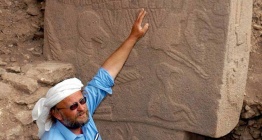
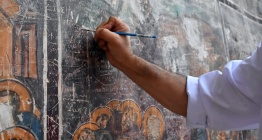
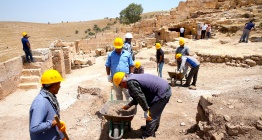

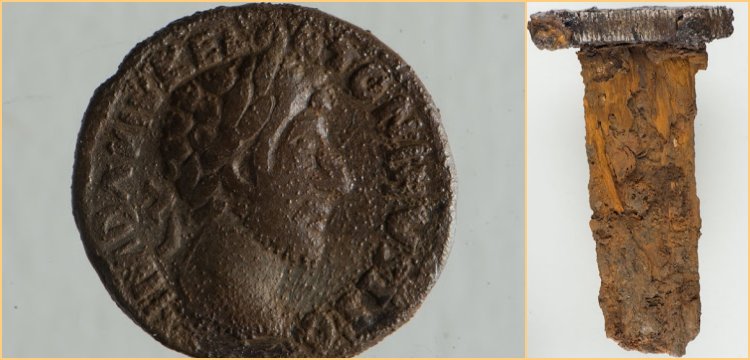
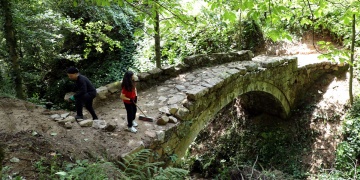 Ressam Serdar Abay, tarihi kemer köprüdeki yabani otları kızıyla temizledi
Ressam Serdar Abay, tarihi kemer köprüdeki yabani otları kızıyla temizledi 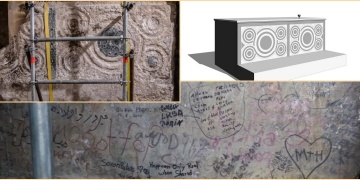 Archaeologists have discoveried a crusader altar in the Church of the Holy Sepulchre
Archaeologists have discoveried a crusader altar in the Church of the Holy Sepulchre  Komodo ejderinin demir dişli olduğu anlaşıldı
Komodo ejderinin demir dişli olduğu anlaşıldı 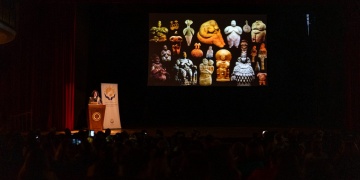 Doğa Taşlardan, Anadolu Tanrıçaları'ndan sonra Anadolu Bacılarının öykülerini anlatacak
Doğa Taşlardan, Anadolu Tanrıçaları'ndan sonra Anadolu Bacılarının öykülerini anlatacak 




